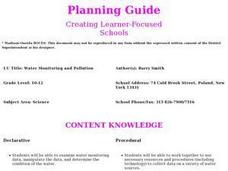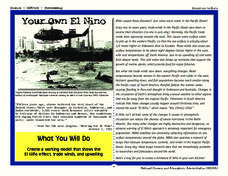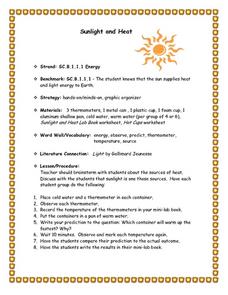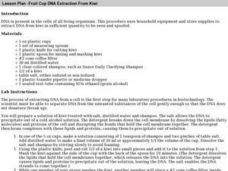US Environmental Protection Agency
Water Purification by Evaporation and Condensation
This easy-to-perform demonstration shows students how the water cycle, specifically the processes of condensation and evaporation, purifies Earth's water supply. Just mix up some water, dirt, and gravel in a glass bowl, place a cup in...
Baylor College
We Need Water
There's nothing quite like a glass of ice-cold, freshly squeezed lemonade. Lesson seven of this series explains how the water humans need to survive can come in many forms. Teach your class about how much water humans require every day...
Curated OER
The Water Cycle (Evaporation, Condensation, Precipitation)
The 3 steps of the water cycle, evaporation, condensation, and precipitation, are the focus of this lesson. After a neat demonstration of rain using hot water, a pie tin, and ice cubes, young scientists observe and discuss the elements...
Curated OER
Measuring the Volume of Water Discharge for a Stream or Canal
Students study how to measure and calculate the volume of water flowing down a stream or canal and use simple tools to make measurements. Next, students determine how many people cold live off the volume of water measured. Finally, they...
Curated OER
The Water Cycle
Students simulate the water cycle. For this water cycle lesson, students create a model of the water cycle. Students draw the water cycle and write a paragraph explaining their drawing.
Curated OER
Stacking Water
Students experiment with different salinities of water using straws and different colors of water. They collect and interpret data from the experiment.
Curated OER
Water Monitoring and Pollution
Students explore the effects of pollution on water supply and how to identify safe drinking water. They test different samples of water over regular intervals and analyze the results to see if they are cyclical or represent a growing...
Rochester Institute of Technology
Heat Transfer
Use an exciting role play activity to teach young chemists about the importance of heat transfer in maintaining homeostasis. They assume the role of a dog sled owner who has been abandoned and must fend for themselves with only a...
NOAA
Your Own El Nino
Scholars make a model to discover how the force of trade winds over the Pacific Ocean creates an El Niño. Super scientists observe how the severe weather affects life in water and on land.
Curated OER
Rain, Rain, Go Away
Students conduct a number of experiments involving evaporation and condensation. They view and discuss a video about the water cycle and then design posters about the rain based on the book "Cloudy With A Chance of Meatballs".
Curated OER
Charting Mold Growth
Students chart mold growth based on food supply. In this mold growth lesson plan, students chart micro-organism growth and the decline of the growth as food runs out.
Curated OER
The Open Ocean, What is it and How Does it Change?
Students investigate the ocean environment. In this ocean lesson plan, students discover the physical properties of the ocean. Over two days, students work in small groups investigating ocean maps and creating water currents.
Captain Planet Foundation
Solar Cooking Race
Study heat transfer with activities that focus on how heat energy works. Using a solar cooker, ice cubes, and heat transfer bracelets, kids experiment and record what they find by keeping ice cubes cold and vegetables hot.
Curated OER
Rising Air
Students investigate the concept of rising air in the formation of clouds and precipitation. In this rising air instructional activity, students conduct an experiment with hot and cold water that shows how warm water rises due to thermal...
Outdoor Learning Center
Outdoor Survival
Which of the following can you survive without for the longest time: water, food, or a positive mental attitude? The answer may surprise you. Guide learners of all ages through games, activities, and discussions about surviving in the...
Curated OER
Silly Semi-Solids
Students create a polymer out of glue, water, and borax. They discuss the resulting substance and perform several experiments with it.
Food a Fact of Life
Soup-er!
Is there anything better than hot soup on a cold day? Kids prepare either vegetable chowder or minestrone soup in an activity that features the use of the stove top.
Curated OER
COLD SEA WATERS
Students examine how old sea waters affected the local and state area during the summer of 1998. Studying a detailed web-site helps students examine sea temperatures.
Calvin Crest Outdoor School
Survival
Equip young campers with important survival knowledge with a set of engaging lessons. Teammates work together to complete three outdoor activities, which include building a shelter, starting a campfire, and finding directions in the...
NOAA
Importance of Deep-Sea Ecosystems – What Killed the Seeds?
Most drugs used today come from nature, so the discovery of new ecosystems in the deep sea is exciting from a medical perspective. Scholars develop their own bioassay to test germination rates in seeds.
Curated OER
The Perfect Storm
In this weather worksheet, students read about the mechanics of a hurricane and then complete 4 short answer questions based on the reading.
Curated OER
Sunlight and Heat
Students brainstorm about the sources of heat. They discuss that sunlight is one of those sources. Students complete a lab about cold water and warm water. They record the temperatures from each thermometer and discuss which container...
Center for Learning in Action
Investigating Physical and Chemical Changes
Super scientists visit ten stations to predict, observe, and draw conclusions about the physical and chemical changes that occur when different states of matter—liquid, solid, and gas—are placed under a variety of conditions. To...
Curated OER
Fruit Cup DNA Extraction From Kiwi
Students extract DNA from kiwi using household equipment and supplies.























